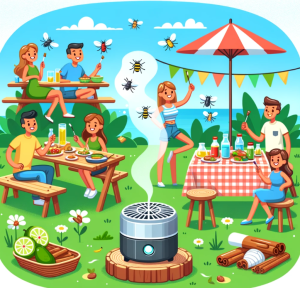
Mosquito Magnetism: What Makes You a Target?
Have you ever wondered why mosquitoes seem to prefer some people over others? It’s not just bad luck—there’s science behind it. Researchers in Zambia have uncovered fascinating insights into why certain people are mosquito magnets, particularly for the notorious malaria-carrying mosquito, Anopheles gambiae. Let’s dive into their groundbreaking study and what it means for public health.
The Mosquito’s Love for Human Scent
Mosquitoes don’t choose their victims randomly. The African malaria mosquito, Anopheles gambiae, is especially drawn to humans, often invading homes to feast on sleeping individuals. This isn’t just a nuisance; it’s a major factor in the spread of malaria, a disease that remains a significant health threat in many parts of the world.

To understand why these mosquitoes target some people more than others, researchers developed a large-scale experiment in Zambia. They used a specially designed system to test mosquito preferences in a semi-field setting that closely mimicked natural conditions.
The Role of Carbon Dioxide and Human Scent
The study revealed that Anopheles gambiae mosquitoes are highly attracted to carbon dioxide (CO2) and specific human odors. CO2 is a key signal that a potential host is nearby. When combined with human body odors, it creates an irresistible lure for mosquitoes.
In their experiment, the researchers used heated targets that emitted CO2 and human scents to see which combinations were most attractive to the mosquitoes. The results were clear: mosquitoes preferred targets that emitted CO2 and human scents, especially those with certain chemical profiles.
What Makes You a Mosquito Magnet?
The research identified specific chemicals in human scent that attract mosquitoes. People who emitted higher levels of certain carboxylic acids, like butyric acid, isobutyric acid, and isovaleric acid, were more attractive to mosquitoes. These acids are byproducts of human metabolism and skin bacteria.
On the other hand, individuals with higher levels of eucalyptol in their scent were less attractive to mosquitoes. Eucalyptol, a compound found in some plants and used in various food flavorings and products, seems to repel mosquitoes to some extent.
Why This Matters
Understanding the chemicals that make some people more attractive to mosquitoes can help in developing better mosquito repellents and attractants for traps. This can be a game-changer in controlling mosquito populations and reducing the spread of malaria and other mosquito-borne diseases.
The Bigger Picture: Implications for Public Health
For public health practitioners, this research offers valuable insights. By identifying and understanding the chemical cues that attract mosquitoes, we can develop targeted strategies to protect vulnerable populations. This could include designing more effective mosquito traps or developing personal care products that mask or neutralize these attractive odors.
A New Approach to Mosquito Control
This study’s findings could lead to innovative approaches in mosquito control. Imagine using a blend of these attractant chemicals in traps to lure mosquitoes away from people, or creating lotions and sprays that neutralize your body’s natural mosquito magnets.
Why You Should Care
Mosquitoes aren’t just an annoyance; they are vectors for serious diseases. Malaria, dengue fever, Zika virus, and more are all transmitted by mosquitoes. Understanding what attracts these insects to humans is crucial in developing effective prevention strategies.
Your Turn: Share Your Thoughts!
- Have you noticed that mosquitoes seem to prefer you over others? What are your go-to methods for keeping them at bay?
- How do you think this research could change mosquito control efforts in your community or around the world?
Join the conversation in the comments below or share your thoughts on social media!
Be Part of the Change – Get Weekly Updates!
Stay informed and connected. Subscribe for free and share this blog to make a difference in public health with others.



